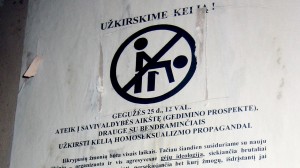
A poster for a 2007 anti-gay rally in Vilnius. The Lithuanian government has repeatedly resisted European Union efforts to hold pro-tolerance events, citing the threat of violence by those opposed to homosexuality as to great to hold such a public event.
VILNIUS — On Tuesday the Seimas opened up discussion on the controversial “minor protection” law after widespread condemnation that the measure discriminates against homosexuals.
The vaguely-written law criminalizes information portraying about homosexuality in a positive way, not only in schools but in any public area in which minors could consume the information. It is not limited to “agitating” for homosexuality, but also polygamy, the paranormal, graphic violence and unhealthy eating habits.
Despite a veto from former President Valdas Adamkus earlier this year, and later a non-binding rebuke from the European Parliament, the Seimas overwhelmingly supports keeping in the controversial language.
President Dalia Grybauskaitė does not support the language of the current bill and asked the Seimas committee on education, science and culture in July to amend the bill. After discussion on the Seimas floor Tuesday, the bill is again being examined by the committee.
The president’s office released a statement to Baltic Reports saying that “the president supports the proposals which were tabled by the expert group, initiated by the president, and hopes that final legislative act won’t have any discriminatory aspects.”
Supporters cite demographics concerns
Valentinas Mazuronis, senior MP for the right-wing Order and Justice Party, said in an interview that he believes this law is intended only to protect children, not to target homosexuals. Petras Gražulis, also of the Order and Justice authored the law. Gražulis has also called for re-criminalizing homosexuality in Lithuania.
“I don’t find discrimination for anyone in this law,” Mazuronis told Baltic Reports.
Because Lithuania is a small country, he added, the law has particular importance for the population. He said the provisions regarding non-heterosexual people focus on “demographic problems.”
“In Lithuania, more people died in the war than from the bomb. For this reason we have a lack of children from year to year,” he said. Mazuronis was referring to the atomic bombs that the United States dropped on Japan in 1945, which killed up to 220,000 people.
Mazuronis said he was not against “scientific” information about homosexuality, but about “propaganda.”
“If somebody wants to discriminate against [homosexuals], I will protect them and their right to live in the way that they want,” he said. But, he added, “I don’t think they can try to influence other people, especially young people.”
Not unanimous
Despite the high level of support, the law does have a handful of opponents in the Seimas. Vytenis Povilas Andriukaitis, a Seimas member for the Social Democratic Party, voted against the law when it was raised in July. He said that he disagrees not only with the bill’s language that focuses on homosexuality, but on the reach of the bill itself.
“This is a mistake. This law should be among our society, but not in the hands of our government,” Andriukaitis told Baltic Reports.
Andriukaitis said that he was concerned with the bill’s potential to infringe on human rights.
“Of course, one very sensitive question is about family law, about whether only Christian values dominate families. My point is very simple: it’s that we have neutral constitutional concepts on family law,” Andriukaitis said.
Andriukaitis said that he was not sure how the final language of the bill would be resolved.
“It is difficult to say what the future will be,” Andriukaitis said. “They have quite a lot of members of parliament who are homophobic—in all factions, all factions.”












